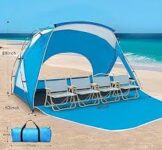
Beach Tents for Outdoor Use: Comfort and Protection for Your Sunny Escapes
Beach tents have become essential gear for beachgoers and outdoor enthusiasts. They provide a convenient and comfortable shelter from the sun, wind, and sometimes light rain, making your time at the beach more enjoyable. This article explores the key features of beach tents, their advantages, and how to select the best one for your needs.
1. Key Features of Beach Tents
To ensure comfort and functionality, consider these essential features when choosing a beach tent:
- Sun Protection: A high-quality beach tent should offer effective sun protection. Look for tents made from materials with a high Ultraviolet Protection Factor (UPF) rating, which blocks harmful UV rays and prevents sunburns and heatstroke.
- Ventilation: Proper ventilation is crucial to keep the tent cool and comfortable. Choose models with mesh windows or vents that allow airflow while keeping out insects. Good ventilation helps prevent overheating and condensation inside the tent.
- Durable Materials: Beach tents should be made from durable, water-resistant materials that can withstand sand, saltwater, and occasional splashes. Polyester and nylon with a water-resistant coating are common choices for beach tents.
- Ease of Setup and Portability: Beach tents should be easy to set up and take down. Look for designs that feature quick and straightforward assembly, such as pop-up tents or models with pre-attached poles. Compact, lightweight designs are also preferred for easy transport.
2. Benefits of Beach Tents
Beach tents offer several benefits that enhance your outdoor experience:
- Sun Shelter: They provide a shaded area to protect you from direct sunlight, reducing the risk of sunburn and helping you stay cool on hot days.
- Wind Protection: Many beach tents are designed to withstand light to moderate winds, offering a stable and comfortable space even when breezes pick up.
- Privacy and Comfort: Beach tents create a private area where you can change clothes, store personal items, or simply relax away from the crowds.
- Easy to Clean: The materials used for beach tents are typically designed to be easily cleaned, removing sand and other debris with minimal effort.
3. Choosing the Ideal Beach Tent
When selecting a beach tent, consider the following factors to ensure it meets your needs:
- Size and Capacity: Determine how many people will be using the tent. Beach tents come in various sizes, from small tents for one or two people to larger models that can accommodate families or groups.
- Weight and Portability: Opt for a lightweight, compact tent that is easy to carry. Look for tents with carrying cases or straps for convenient transport.
- Ease of Assembly: Choose a tent with a simple setup process. Pop-up tents or models with easy-to-use pole systems are often the most user-friendly.
- Stability and Anchoring: Ensure the tent has a good anchoring system or stakes to keep it secure on sandy or windy beaches. Some models come with sandbags or additional anchors for added stability.
4. Maintenance and Storage
To extend the life of your beach tent, follow these maintenance tips:
- Regular Cleaning: Clean the tent after each use to remove sand, salt, and other residues. Use a soft cloth and mild soap, and avoid harsh chemicals.
- Complete Drying: Make sure the tent is thoroughly dry before packing it away to prevent mold and mildew growth.
- Proper Storage: Store the tent in a dry, cool place, away from direct sunlight. Avoid storing it in damp or excessively hot conditions.
Conclusion
Beach tents are a valuable addition to your outdoor gear, offering comfort and protection during your beach outings. With features like sun protection, ventilation, and ease of setup, they enhance your beach experience by providing a shaded, private space to relax. By choosing the right tent and taking proper care of it, you can enjoy many pleasant days by the water with minimal hassle.





